|
Tickets for our 2020 Lecture Day held on February 15 at Edgar Hall, 8 Cary Court, Somerton Business Park, TA11 6SB are on sale now!
The £5 cost includes tea and coffee but not lunch (!) - book online via Eventbrite or send a cheque for £5 per ticket made payable to SBKA together with a S.A.E., to The Treasurer, Allways, West Shepton, Shepton Mallet, Somerset, BA4 5UH Programme 9.00 Coffee 9.30 Opening by Jackie Mosedale, President of SBKA. 9.35 'Through winter into spring': Clive de Bruyn 10.40 'Honey Bee mind/navigation': Prof. Lars Chittka 11.40 Coffee 12.10 'Bee stings': Dr. Nikos Tsiougkos 1.10 Lunch. During the break Lynne Ingram and other AHAT members will be available to talk about the Asian hornet and answer any queries. 2.20 Thanks and Presentations 2.30 'How to make Mead and Melomels': Dinah Sweet 3.30 Raffle and Tea 4.00 'What I have learned from Beekeeping in the past fifty years': Clive de Bruyn 5.00 Close Clive de Bruyn FIBKA Snr., BBKA Snr., N.D.B. Clive has been a beekeeper since the 1960s. He is one of the best-known and respected beekeeping authorities in Britain and Ireland. Based in Essex, where he runs over 100 colonies for queen-rearing, honey production and pollination. He is a prominent member of the Bee Farmers’ Association, where he has been the Education Officer since 1982. As well as being a bee farmer, Clive has studied, worked and presented papers within an international forum for many years and done much work in third world countries. In addition, he has written several books including the indispensable “Practical Beekeeping”. Prof Lars Chittka FLS, FRES, FSB is a German zoologist, ethologist and ecologist distinguished for his work on the evolution of sensory systems and cognition, using insect-flower interactions as a model. He is also the founder of the Research Centre for Psychology at Queen Mary University of London, where he is a Professor of Sensory and Behavioural Ecology. Chittka has carried out extensive work on the behaviour, cognition and ecology of bumblebees and honeybees, and their interactions with flowers. He developed perceptual models of animal colour vision, allowing the derivation of optimal receiver systems as well as a quantification of the evolutionary pressures shaping flower signals. Chittka also made fundamental contributions to the understanding of animal cognition and its fitness benefits in the economy of nature. He explored phenomena such as numerosity, speed-accuracy trade-offs, false memories and social learning in bees. His discoveries have made a substantial impact on the understanding of animal intelligence and its neural-computational underpinnings. He has published over 250 peer-reviewed articles, many of them highly cited. Dr Nikos Tsiougkos is an Allergy specialist and has been working in the UK in the last five years. He obtained his Specialty (Allergy and Clinical Immunology Degree) degree in Athens/Greece and holds a certificate of excellence in Allergy having sat the European Examination in Allergology and Clinical Immunology (EAACI/UEMS). He has a master’s Degree in “Clinical Applications of Molecular Medicine”/ University of Thessaly, Greece. He speaks four languages and in his spare time he enjoys travelling and collecting fine art. Dinah Sweet started her beekeeping with husband John, 40 years ago. Dinah Sweet completed a Diploma dissertation in Apiculture at Cardiff University on melissopalynology (the study of pollen grains in honey) supervised by the legendary Rex Sawyer, author with Robert Pickard of “Pollen Identification for Beekeepers”. Since then she has been examining honeys for commercial packers and giving talks on the topic to Beekeeping Associations. She has held positions within BIBBA and the Welsh Beekeepers Association and often gives talks. She wrote the National Honey Show booklet on Mead for showing and drinking She has been judging mead at the NHS for the last 10 years and also recently finished a number of years, working as a bee inspector. At this time of year, when our bees don’t require so much looking after, lots of us enjoy cleaning all our lovely cappings and making things with our beautiful beeswax.
Beeswax wraps are becoming increasingly popular as a natural alternative to plastic cling film for food storage: They are durable, versatile, reusable, recyclable and perfect for lots of foods except hot food and meat or meat products. We often get asked for information about how to make them and the legislation which governs their sale. Fortunately, Anne Rowberry, Vice Chair of the BBKA, a member of Frome Division and Chairman of Avon BKA, has compiled a how-to guide with links to the relevant food safety regulations. This is the first in a series of educationally-based articles written by Master Beekeeper Tricia Nelson from Quantock Division. The end of one beekeeping season and the start of another; time to reflect on what happened this year and what you want to do next. What went well for your bees? What didn’t? What might be worth trying next year? So, what sticks out in my recollections of the year which might be of interest to you? Driving bees We have all learned that bees walk uphill into dark spaces. Hence smoking swarms up into skeps, tucking your trousers in your socks and covering your wrists so they don’t walk up your trousers and sleeves. Some of us have shaken a swarm out onto a sheet arranged over a sloping board leading up to a new hive and watched them slowly processing into the hive and how they surge up and in once the queen enters. However, seeing exactly the same behaviour in response to a rhythmic and persistent tapping on the sides of the skep with no smoke used at all was extraordinary. It was so quick, almost instantaneous. I hope you enjoy the videos and the photos. Saving the brood comb Equipment needed:
I thought this was an extremely useful technique to learn, very difficult in the hot conditions facing David during his demo, but particularly useful if you have do a cut out when retrieving a swarm, so perhaps it is worth keeping a few strung frames, a flat board and a knife on standby for just such occasions!
At the start of Asian hornet week (Sept 9-15) Somerset Beekeepers Association has published a suite of Asian hornet resources we've produced and are happy to share.
Meanwhile our Asian hornet actions teams are busy following up on reports from local people. For example, in the Minehead and Exmoor area there have been several unconfirmed sightings which the local AHAT is investigating. Our Asian hornet roadshow rolls into Taunton's Farmers Market on Thursday & Somerset County Show on September 21-22. The NBU found and destroyed an Asian hornet nest in Tamworth, Staffordshire last week. In Jersey they have caught 69 queens and discovered 54 nests so far this year. While here in Somerset we haven't had a confirmed sighting yet but fear it is just a question of time. If you spot an Asian hornet, perhaps feeding on flowering ivy, take a photo and report through the Asian Hornet Watch app or [email protected]. If you need some help, contact us direct [email protected] Anne Rowberry, Somerset AHAT member and BBKA Vice Chair writes:
"An Asian hornet sighting was confirmed in the Tamworth area of Staffordshire on September 2, 2019. This is the first report since July, when a single hornet was confirmed in New Milton, Hampshire. In each case they were spotted and reported by a member of the public. Since 2016, there have been a total of 15 confirmed sightings of the Asian hornet in England and six nests have been destroyed. Nine of these sightings occurred in 2018; an individual hornet in Lancashire (April) and Hull, three in Cornwall, two in Hampshire, one in Surrey (all September) and one in Kent (October). The risk of an active Asian hornet nest being found in the UK is negligible during the colder winter months, but higher during the summer. Asian hornets have already been spotted this year in countries close to the UK (France and Jersey) and a risk remains at all times of year of accidentally transporting an Asian hornet when returning to the UK from abroad. It is crucial you report any possible sightings so our experts can take quick and effective action to eradicate Asian hornets." Asian hornets are a notifiable invasive species and should be reported immediately, preferably with a photo: Asian Hornet Watch app for iPhone Asian Hornet Watch app for Android or [email protected] the online recording form http://www.brc.ac.uk/risc/alert.php?species=asian_hornet [email protected] Congratulations to Mark and Christine Gullick from Burnham Division who were awarded the Bronze Bee for winning the most points at Bristol’s Bee and Pollination Festival on Saturday.
They beat extremely tough competition to scoop seven firsts, five seconds, three thirds and one highly commended. Next stop: the National Honey Show! |
Archives
March 2024
Categories
All
|
Somerset Beekeepers Association Charity © 2021 Registered CIO Charity 1206483
Affiliated to the British Beekeepers Association
Click here to view our Privacy Policy
Affiliated to the British Beekeepers Association
Click here to view our Privacy Policy
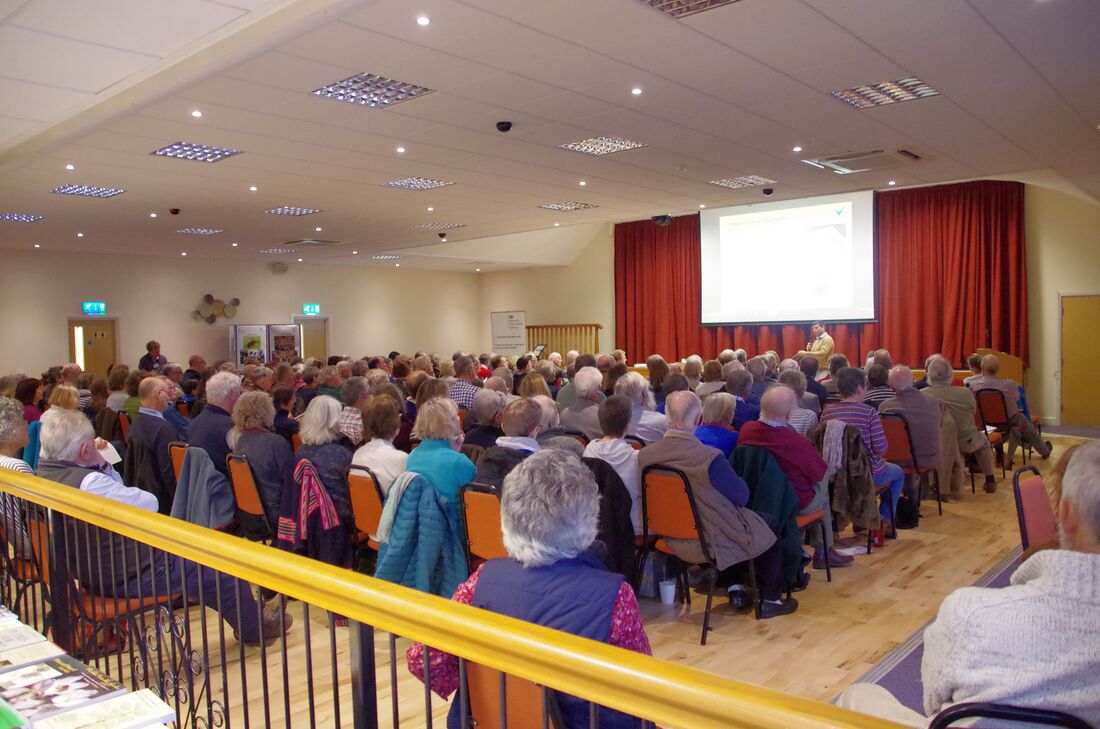
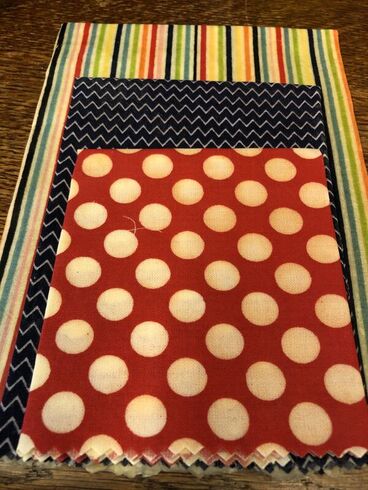
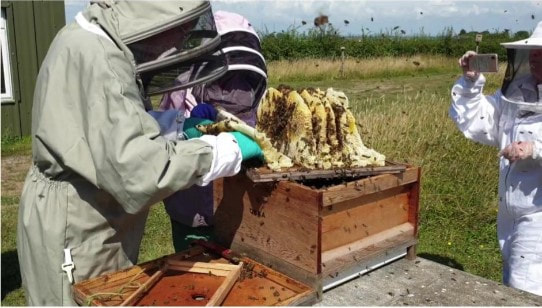
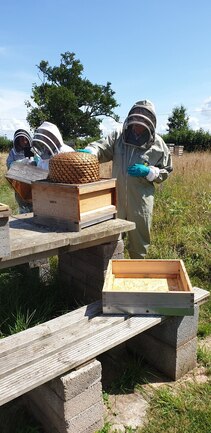
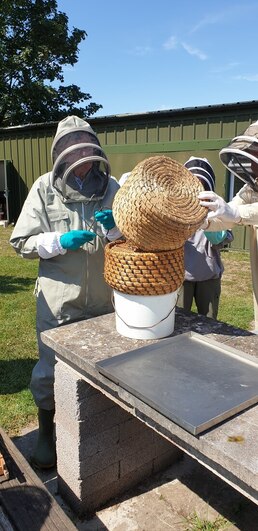
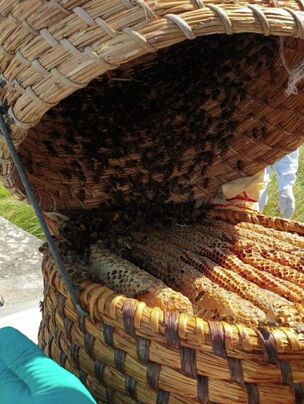
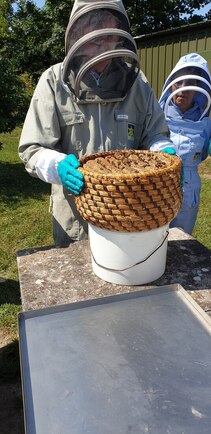
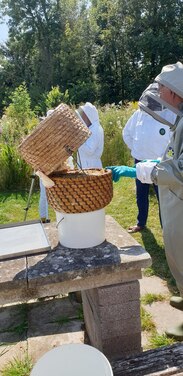
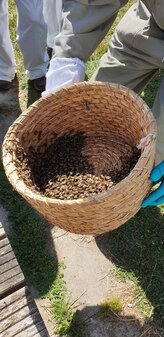
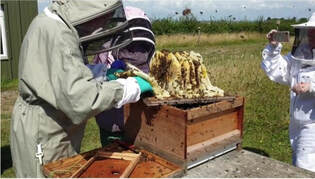
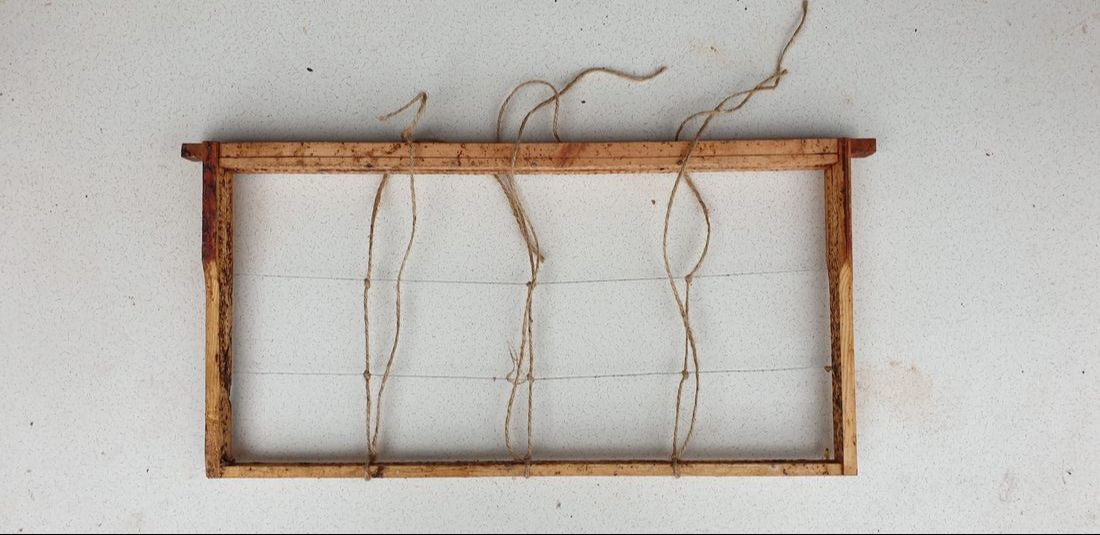
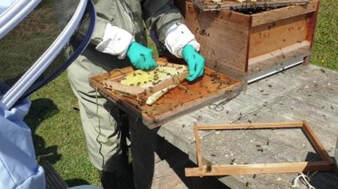
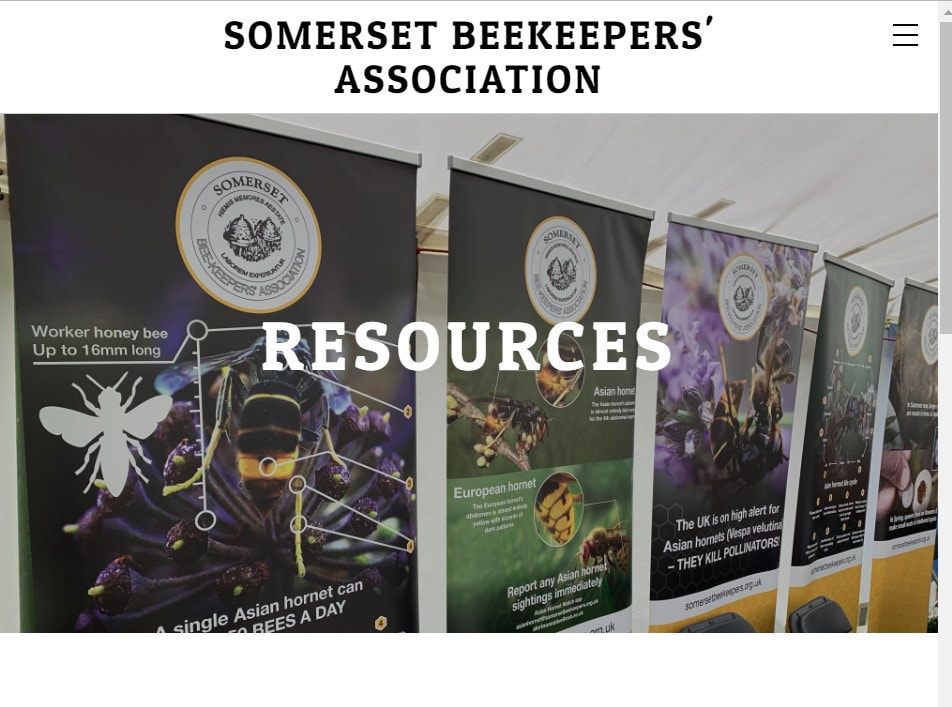
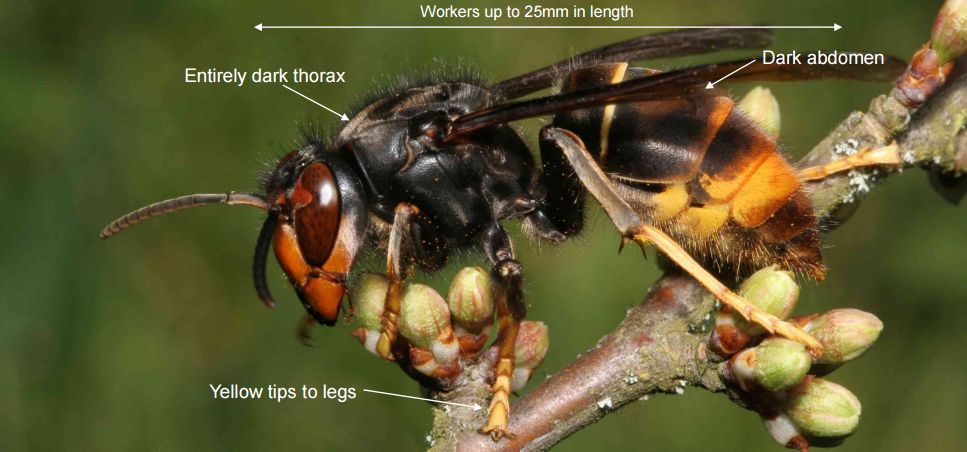
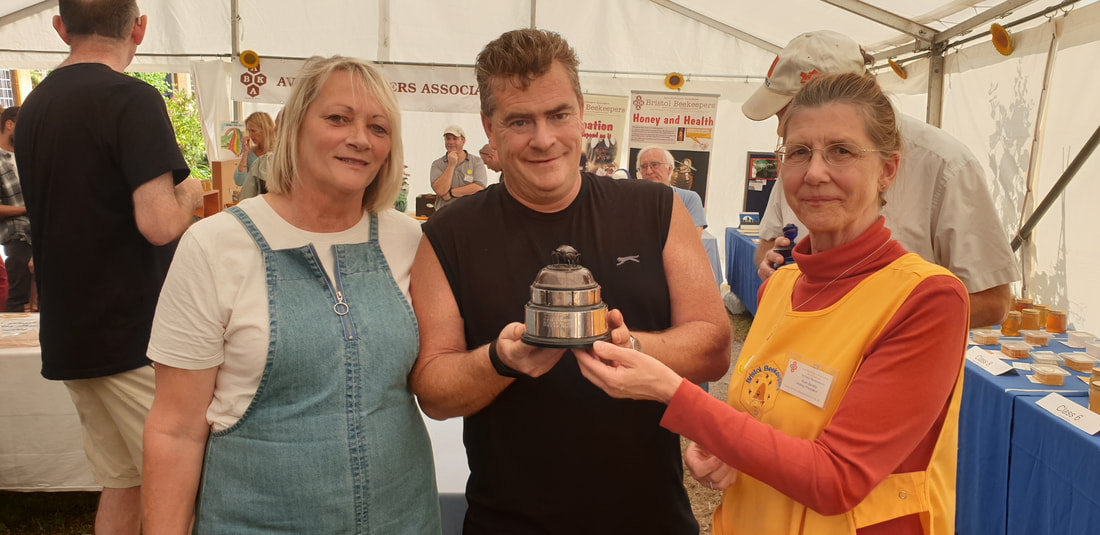
 RSS Feed
RSS Feed
